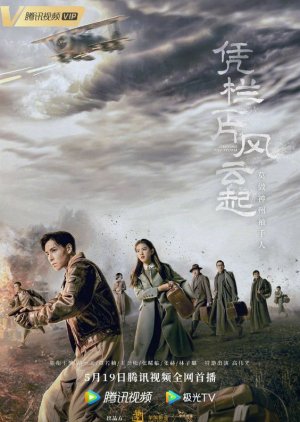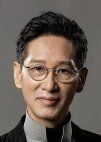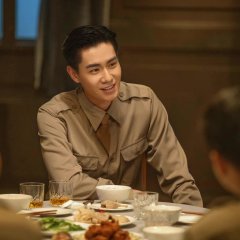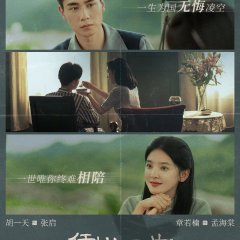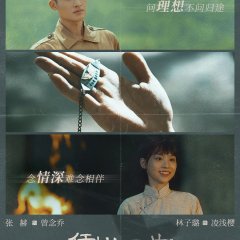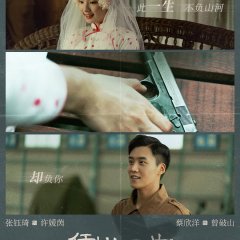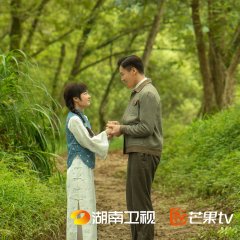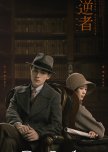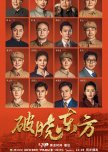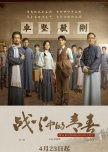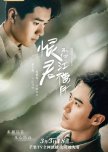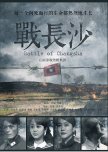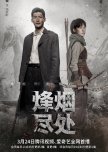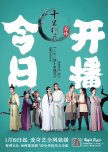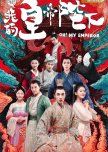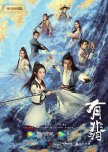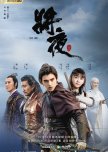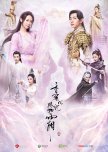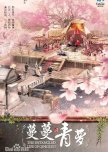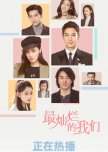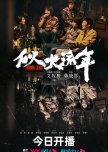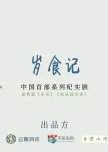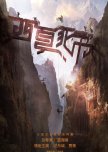During the difficult period from 1937 to 1945, two generations of three intellectual families in Peiping make choices and sacrifices in the face of great turmoil and changes of the times. Some people choose to protect Chinese culture and continue the cultural bloodline. There are both idealists and realistic activists. They try their best to save the nation and survive, actively search for a way out for the country, and finally head towards the light. (Source: CdramaLove) Edit Translation
- English
- Italiano
- Deutsch
- Português (Brasil)
- Native Title: 凭栏一片风云起
- Also Known As: Leaning on the Railing , A Storm of Wind and Cloud , Ping Lan Yi Pian Feng Yun Qi Zu Xun , 憑欄一片風雲起
- Genres: Historical, Romance, Drama, War
Where to Watch Defying the Storm
Subscription (sub)
Free (sub)
Cast & Credits
- Zhang Ruo NanMeng Hai TangMain Role
- Hu Yi TianZhang QiMain Role
- Wang Jin SongLing Wen YueMain Role
- Zhang HeZeng Nian QiaoMain Role
- Zhang Xi LinMeng Wu RanMain Role
- Lin Zi LuLing Qian YingMain Role
Reviews

This review may contain spoilers
Emotional drama that uses historical facts as a framework
Before I present a rounded reality check, I want to talk about my basic impressions.For this reason, my review is structured as follows:
I. Basis of Interest
II. Expectations
III. Brief synopsis
IV. Impressions
V. Fiction vs. reality
VI. Conclusion
I. Basis of Interest
The drama caught my interest because of two basic factors. First, because of my professional background, I find it exciting to observe how countries deal with their own history in entertainment formats. Especially with a country like China, which is significantly characterized by censorship from the CCP, my own curiosity in terms of historical reappraisal is very high. For this reason, I particularly watch productions from all kinds of countries about the war past, since the genre itself is characterized by an emphasized patriotism and reveals the character of coming to terms with the past.
Secondly, since I would describe myself as a fan of the actor Hu Yi Tian, this production offered me the opportunity to combine my professional interest with my hobby.
II. Expectations
To be honest, I started the Drama with few expectations. Especially after I read some devastating comments on MDL. However, I gave little importance to "the drama promotes communism" (it's a Chinese drama produced for the chinese market, what do you expect?) and "Hu Yi Tian is a bad actor" (I see it differently, but tastes differ). Other comments accusing it of falsifying history made me fear the worst. However, since in my opinion every country has the right to tell its own story, I prepared myself to watch the drama critically. Now, before the unimaginative accusation of being a fangirl comes up again, I'll just say this: even if I'm a fan of an actor, that doesn't mean I like all of his work. However, it encourages me to give a project a chance and make a fair judgment.
III. Brief synopsis
The fictional drama fundamentally focuses on the years between 1937 and 1945, a point in time that not only encompasses the Second Sino-Japanese War aka Asian-pacific war, but is set directly between the 1st and 2nd phases of the Chinese Civil War. The plot focuses on three academic families from two generations and the experiences of fighter pilots. While the academics resist the Japanese assimilation policy to rewrite Chinese history with science, the soldiers experience the war from the air and through the decisions of the Kuomintang national government. The drama thus tells a story of escape, resistance, personal fates, political changes and the trauma of war through a small group of people. They also fall in love, but this is not the focus of the drama. While the characters' experiences are fictional, the series uses scientifically proven historical events as the framework of the narrative. Due to the chronological placement in the area of tension between nationalists and communists, this conflict is directly addressed and provides an answer to the question of why communism was able to grow in China in the first place.
IV. Impressions
The script surprised me in a positive way. The diverse characters are written very entertainingly and make empathizing very easy. I liked all the love stories and the friendships very much. While I'm used to getting a lot of filler episodes in Chinese dramas, I didn't get that impression here. The show kept me very entertained from start to finish. Surprisingly, I found the idea of using Chinese history with the Wu Ding bone to be very appealing on a linguistic level. The physics professor was just entertaining and offered a lot of humor. Being less of a fan of pronounced patriotic attitudes, I was surprised by the comprehensibility of the soldiers' decisions. In addition, I was very enthusiastic about the settings and the music, which completely catapulted me into the action of the drama. Since the series takes many historical facts as background, I always checked the actual scientifically proven background when I had my own uncertainties and therefore took my time watching. Overall, I was very surprised that the Japanese were not drawn more negatively due to the extremely negative occupation past. The theme of communism and nationalism was recurring and only made sense. It would have been odd not to mention this, as it is a defining element of this time. However, as a viewer, I had less the impression that I was to be convinced of the political system than to learn about Chinese history from the Chinese perspective and to learn about its roots. To be honest, after all the negative comments, I was extremely pleasantly surprised at how closely the drama adheres to real facts that are also accepted in Western science. I had absolutely not expected that. But more about that in the next point. One must not forget that the drama was produced as an entertainment element and not as a documentary! Moreover, the series does not offer more or less propaganda than contemporary Chinese series. The only difference is that communism is the theme of the story and does not come through the back door as in fantastic dramas or dramas set in the present. If this bothers you, you should stay away from Chinese dramas completely.
As for the casting, I thought it was very successful from young to old. Although I watched the series as a Hu Yi Tian fan, I have to admit that he could have been a bit more on point in (1) moments where he has to show weakness and (2) clearly emotional moments. Since he is very tall and slim, he seemed very stiff in the uniform. However, nothing has changed in my fan position. I actually think it's very good that he's trying out new genres and growing from them.
V. Fiction vs. Reality
Given that the core of the review is focused on a drama and not a scholarly treatise, I will only address the basic topics that are relevant to the era. If anyone is interested in scientific papers about it, feel free to write to me and I'll give you links for further reading.
Historical background
In 1930, the Central Plains War broke out across China, involving regional commanders who had fought in alliance with the Kuomintang during the Northern Expedition, and the Nanjing government under Chiang. The Chinese Communist Party (CCP) previously fought openly against the Nanjing government after the Shanghai massacre of 1927, and they continued to expand during this civil war. The Kuomintang government in Nanjing decided to focus their efforts on suppressing the Chinese Communists through the Encirclement Campaigns, following the policy of "first internal pacification, then external resistance".
The Second Sino-Japanese War refers to the all-out war waged by the Japanese in China, which began on July 7, 1937 and lasted until September 9, 1945. After the Japanese attack on Pearl Harbor on December 7, 1941, U.S. entry into the war, it was a stage of the Asian-Pacific War and thus part of World War II.
Fiction
All experiences of the characters are fictional. The greatest creative freedom is given to the selflessness of the soldiers. In the post-war analysis, scholars agree that the Chinese armed forces during the war were said to have not only weak combat morale, but also significantly weakened due to the corrupt government that hindered any organization. Thus, the airmen of the drama are not representative of the spirit of the times! In fairness, this situation is actually addressed in the form of a word fight in the series, even if it is only a subordinate clause. As for the scientific theme in the form of archaeologists and linguists, I cannot make a statement. However, there has been resistance to the Japanese assimilation policy in all Japanese-occupied countries. The question is to what degree this was actually successful.
The individual fates of the characters and their personal character developments as well as political perspectives are representative of the zeitgeist of a limited group. (Keyword: preparation for the second phase of the Chinese civil war)
Reality
The drama directly addresses crucial stages of war. The Mukden Incident. The Nanjing Massacre. The Battle of Shanghai and much more. It is not so much the case that the characters are always on the spot, but more learned from the newspapers or from people they know. While all the characters are constantly moving through the country, the historical events give the narrative a chronological framework.
Because of the timing between the first two phases of the Chinese civil war, the following elements are correctly addressed:
- weak, corrupt national government (Kuomintang)
- secret organization of communists at the rural level
- the government's failure to act in the face of the Japanese invasion (failure to declare war, recall of combat units, government's proportional cooperation with Japan, leaving the population alone despite military force, weak government, etc.)
- strengthened resistance and growth of communist ideology within the people in response to the weak government (of course, there were Chinese resistance movements during the war - even if they were not nearly as successful as they wanted to be - and later led directly to civil war immediately after the Second Sino-Japanese War)
- the attitude of the nationalist government to prefer the fight against communists instead of fighting against the Japanese (in the drama, the official armistice between communists and nationalists between 1937 and 1945 is clearly addressed, but also said that the nationalists did not adhere to it - sad fact)
- the support of both the American and British governments is mentioned again and again
- the poor equipment of the Chinese combat troops and the lack of coordination even after official entry into the war is a decisive factor for the growth of communist conviction within patriotic-minded individuals
- the drama does not say at any point that the war was won by the Chinese resistance alone. In fact, it reports on the successes of the Allies and limits the resistance issue to the threat to the small group in view of the Wu Ding bone evaluation.
- in the end, the drama emphasizes that due to the experiences of war, communist ideology was also spread through universities and the communists won the civil war
- in some places the >white terror< is mentioned, which later also became decisive for the history of Taiwan and which since the Taiwanese democratization and reform belongs to the successfully overcome, dark past (at this point I would like to take the opportunity to emphasize how much respect I have for taiwanese development)
- a lot of patriotism and nationalism (resistance = communist attitude)
Thus it can be said that the drama makes use of basic historical facts and processes them superficially. As is typical of the war genre, there is a lot of pathos and love of the fatherland presented. However, this is an element that can be found in worldwide productions about one's own history. The drama will convince you less of the fact that communism is good. In fact, it shows you more how communism was able to gain power.
At this point, it should be emphasized once again that it is a fictional drama and serves the entertainment. If something seems strange to you, I can only encourage you to look critically and check facts.
VI. Conclusion
I liked the drama very much. It knows how to entertain at every point and offers an emotional portrait of people in times of war. Although the tension between communists and nationalists is a recurring theme, it does not dominate the drama. In addition, nationalists are not portrayed as mere villains, but as people with their own beliefs and values. In addition, I found it interesting that survival guilt is also addressed and is often neglected. The insight is definitely exciting and thrilling with you. If you take a critical look at the drama and are open to a fictional show that presents you with limited facets of war, then I can only encourage you to give the drama a chance. In my opinion, it is worth watching.
Was this review helpful to you?

This review may contain spoilers
This drama is really amazing
I really enjoyed this drama so much ,, it has a lot of emotions and good feelings about love ,, friendship and family all for the love of the country ,, yes it has some bad scenes not accurate or some bad acting performance from the male lead but that didn't ruin my experience of enjoying watching this dramait was fast paced ,, it has good Bromance and it was really fun ride ,, I laughed ,, cried and loved all the characters
there are many stories told and all of them are very emotional in good way stories
why all the hate for the leads ,, I have no idea and this drama ranked four in china viewing chart for it's channel
it's also subbed to many languages officially
Was this review helpful to you?
Recent Discussions
| Title | Replies | Views | Latest Post | |
|---|---|---|---|---|
| helping in understanding the drama defying the storm by Mhiss A | 12 | 0 | Carli Sophie Aug 10, 2022 | |

